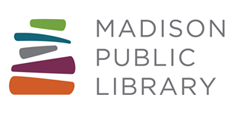Join fellow Madison cinephiles for a monthly movie night at Central Library! Hosted by Jason Fuhrman, Cinesthesia is an adventurous, eclectic series of classic and contemporary films that focuses on the complex relationship between literature and cinema. Cinesthesia strives to foster constructive dialogue, while breathing new life into controversial works, neglected masterpieces, and titles in the margins of film history.
Beginning in 2013, Cinesthesia ran annually until 2020, taking a four year hiatus due to the COVID-19 pandemic, and returned to form in 2024. Jason and the Madison Public Library are very excited to welcome in another year of thoughtful film screenings and discussions!
All screenings will take place on the 3rd floor of Central Library in Room 302.
Cinesthesia Lineup 2025:
- January 15, 6:30pm - Naked Lunch (1991) by David Cronenberg
- February 26, 6:30pm - Something Wild (1986) by Jonathan Demme
- March 19, 6pm - Amores Perros (2000) by Alejandro G. Iñárritu
- April 30, 6:30pm - Deep Cover (1992) by Bill Duke
- May 21, 6pm - The Tree of Life (2011) by Terrence Malick
- June 18, 6:30pm - Cooley High (1975) by Michael Schultz
- July 16, 6:30pm - Double Indemnity (1944) by Billy Wilder
- August 20, 6:30pm - The Cell (2000) by Tarsem Singh (Postponed to September 3)
- September 17, 6:30pm - Devil in a Blue Dress (1995) by Carl Franklin
- October 15, 6:30pm - Candyman (1992) by Bernard Rose
- November 19, 6:30pm - Smithereens (1982) by Susan Seidelman
- December 17, 6:30pm - Blast of Silence (1961) by Allen Baron
Click the links above to learn more about each film in the lineup. No registration required; all are welcome.
A Brief Interview with Cinesthesia Programmer Jason Fuhrman!
What inspired you to choose these Cinesthesia screenings for the library this year? What do you hope people gain out of these screenings?
I really hope that people who attend these events discover something they didn't know existed before. Perhaps they see a film that broadens their horizons, and are able to experience that feeling with an actual audience. I always try to curate films that are more under the radar, or neglected across film history due to various social/historical reasons.
There is no real overarching theme behind the films I select, but there is a loose thread I follow since I do try and find films that are based on some sort of published literary work. I also enjoy constructing a narrative progression with the films that I choose throughout the year and find that it is conducive to creating unexpected connections between the films.
At the ends of the Cinesthesia screenings, I like to encourage some informal conversations amongst the audience members, and that happens more often if I select films that I know will spark dialogue or strong reactions from the audiences.
What do you think is the relationship between film and literature?
I have always been an avid reader, so cinema and literature are two of my greatest passions, and I believe there is a very reciprocal relationship between the two. A lot of the best movies in recent history are based on books or literary works and even today books are still feeding the film industry. Many historical books/plays, like the works of Shakespeare and Jane Austen, have had numerous iterations and remakes across decades of film history, with some being extremely faithful to the source material, and others taking complete creative liberty.

There are many good book to film adaptations, and newer books are getting film deals very quickly. What makes a good book to film adaptation in your opinion?
To me, a good film adaptation remains faithful tot he book but pushes it to a different artistic level that might change the way audiences view the original work. Film is a different artistic medium than literature, and I believe that much of the beauty from book to film adaptations comes with how to translate language into a visual medium. How you can merge two different forms of art. I also appreciate adaptations that are timeless and continue to reinvent the form of cinema and attract new audiences as time goes on.
Some of my personal favorite book to film adaptations include A Clockwork Orange (1971), the Dune iterations from David Lynch and Denis Villeneuve, and Naked Lunch (1991).
What were your last four watched films?
I rewatched Double Indemnity (1944) to prepare for this month's screening and discussion, as I like having a fresh memory of what the film is like in my mind beforehand. It helps me prepare my notes beforehand as well.
The other three films I watched were all being shown at the Cinematheque downtown, which is another great place to find well curated film screenings for free in Madison.
I rewatched David Lynch's The Elephant Man (1980), which they screened in honor of his passing. I was also able to catch Return of the Living Dead (1985) for the first time, which was a lot of fun to watch with an audience since it's such a culturally impactful zombie film and they screened it on Independence Day, which is when the film takes place as well. The last film I watched at the Cinematheque was The French Connection II (1975), which was screened in honor of Gene Hackman's recent passing. It was nice to be able to see the sequel after many years since watching the first film, even if it wasn't as good as the original.
"Movies are the most powerful empathy machine in all the arts. When I go to a great movie I can live somebody else's life for a while. I can walk in somebody else's shoes. I can see what it feels like to be a member of a different gender, a different race, a different economic class, to live in a different time, to have a different belief."
- Film Critic, Robert Ebert



